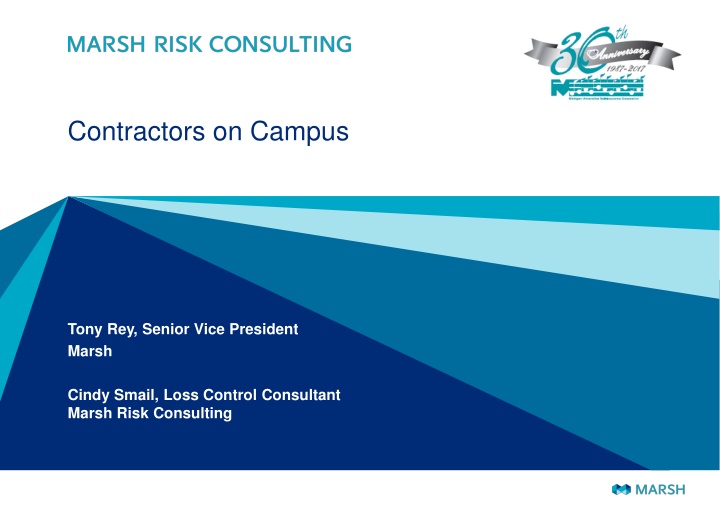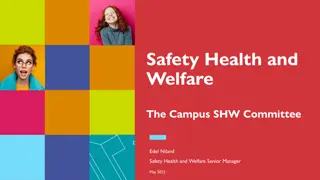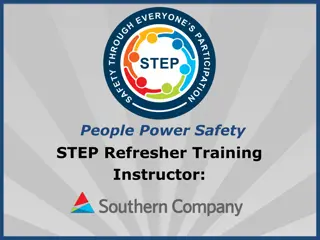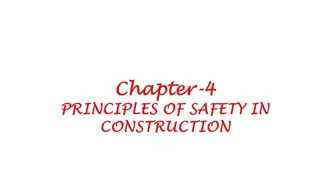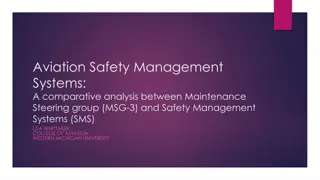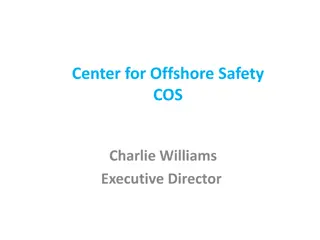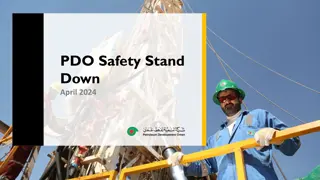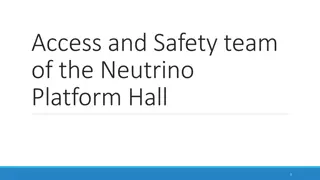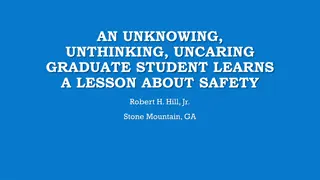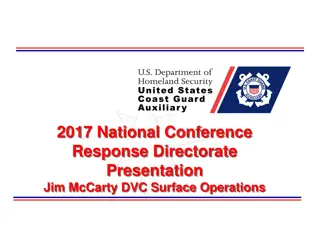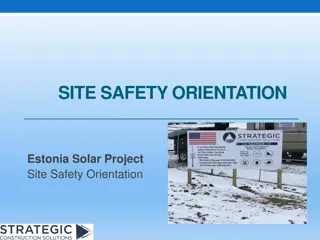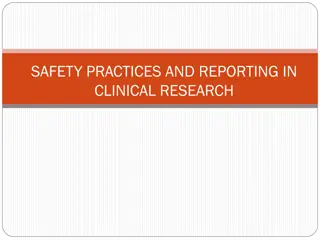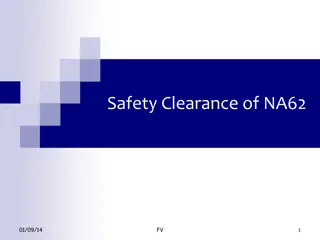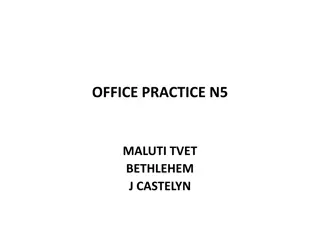Ensuring Contractor Safety in Higher Education: Key Practices and Guidelines
Highlighting the importance of contractor safety in higher education, this content emphasizes the need for effective safety planning, compliance with OSHA standards, and risk mitigation strategies. It discusses serious events in higher education related to contractor safety and provides insights on safety pre-qualification, orientation, work area controls, hazardous work permits, supervision, and insurance. Contractors' safety planning, hazard prediction, safety criteria review, controls identification, and safety goal setting are crucial steps in minimizing hazards and ensuring the well-being of workers in educational settings.
Download Presentation

Please find below an Image/Link to download the presentation.
The content on the website is provided AS IS for your information and personal use only. It may not be sold, licensed, or shared on other websites without obtaining consent from the author.If you encounter any issues during the download, it is possible that the publisher has removed the file from their server.
You are allowed to download the files provided on this website for personal or commercial use, subject to the condition that they are used lawfully. All files are the property of their respective owners.
The content on the website is provided AS IS for your information and personal use only. It may not be sold, licensed, or shared on other websites without obtaining consent from the author.
E N D
Presentation Transcript
Contractors on Campus Tony Rey, Senior Vice President Marsh Cindy Smail, Loss Control Consultant Marsh Risk Consulting
SERIOUS EVENTS IN HIGHER EDUCATION 2016 Marsh Risk Consulting Region Incident Result South Contractor employee fell from roof Fatality Midwest Crane collapsed on university building Property damage South Man lift tipped over Fatality Midwest Contractor employee fell from roof Fatality Northeast Contractor employee fell from roof Fatality South Contractor employee fell after being struck during demolition for a stadium renovation Trial award of $53K, 25% - demolition contractor, 75% general contractor Northeast Scaffold collapse 6 injured, 1 employee filed claim, jury award $2 million 1 MARSH RISK CONSULTING
Why Contractor Safety? Contractors are on campus often! Outside contractors pose serious risks to your workers, property, and the facility operations Some laws require contractor safety practices Safety performance is an indicator of work quality It s a good business practice 2 MARSH RISK CONSULTING
Todays Focus 1. Safety Planning 2. OSHA 3. Safety Pre-qualification 4. Contractor Safety Orientation 5. Work Area Controls 6. Hazardous Work Permits 7. Supervision 8. Insurance 3 MARSH RISK CONSULTING
Contractor Safety Planning Predict hazards for work to be done Review safety criteria in pre-bid meetings Identify controls Contractors write site safety plan address hazards & controls Set safety goals 4 MARSH RISK CONSULTING
OSHA Construction Safety Standards The Occupational Safety and Health Administration (OSHA) requires contractors to have a safety program available at the work site covering the following: Designation of qualified safety person Safety instructions for employees regarding the tools and equipment they will use Self-inspection program Hazard recognition instructions Chemical safety details Confined space procedures The program will be available at the work site. 5 MARSH RISK CONSULTING
Avoid Multi-Employer Duty Issues More than one employer can be cited by OSHA on construction sites. As the owner you need to be sure you did not: Create the hazard Expose your employees to the hazard Assume responsibility for correcting the hazard Control employees on the site 6 MARSH RISK CONSULTING
OSHAs Stance on Host Employers and Contractors When employees of an outside contractor come into your workplace, both your organization (what the OSHA calls the host employer) and the contractor share responsibility for the safety of the contractor s employees. The dividing line between areas of responsibility is not always clear, but consider the following rule of thumb as a starting point: The contractor is responsible for making sure that its employees know how to do their jobs safety. The host employer is responsible for informing the contractor of any hazardous conditions that are specific to the host s workplace and stipulating any special controls or work practices that the contractor must follow to protect all workers. 7 MARSH RISK CONSULTING
Safety Pre-qualification of Contractors Criteria Loss History Reference Checks Prior History on Your Campus Contractor s Safety Program OSHA Compliance History 8 MARSH RISK CONSULTING
Safety Pre-qualification - Loss History Loss History Sources: Injury/illness rates compared to others in industry (OSHA logs) Claims experience (workers compensation, auto liability, general liability, etc.) Workers compensation experience MOD Look for trends and key indicators Establish minimum safety performance standards Workers Compensation MOD less than 1.0 OSHA incident/severity rate less below average for Standard Industry Classification (SIC) 9 MARSH RISK CONSULTING
Safety Pre-qualification - Safety Reference Checks Reference checks should consider: Similar jobs - value and scope of work Safety compliance/culture Safety experience 10 MARSH RISK CONSULTING
Safety Pre-qualification - Prior History on Your Campus Contractor s compliance to their own safety requirements Contractor's compliance to your campus safety requirements Working relationship with campus safety and security teams Adherence to safety paperwork needed PPE use observed Sanitation practices 11 MARSH RISK CONSULTING
Pre-Qualification Contractors Safety Program Contractors safety program review: Program in writing Set schedule for toolbox meetings Self-inspection program in place Training plan for orientation and ongoing training of new workers and foreman Responsibilities are assigned Enforcement policy Traffic control Emergency procedures Accident investigation High hazard tasks determined and addressed Fire protection Site safety and security Sub-contractor requirements Resume of site safety person 12 MARSH RISK CONSULTING
Pre-job Meeting Safety Items Agree upon job organization and procedures General safety rules, university policies are communicated High hazard areas are discussed Control measures Control measures are reviewed Other safety paperwork - inspections, accident procedures, disciplinary measures, etc. maintained Site safety plans by contractors are reviewed 13 MARSH RISK CONSULTING
Contractor Safety Orientation Contractor employees should know: University s safety program/rules Reasons for dismissal from project Hazards associated with operations Emergency procedures Orientation should be documented Orientation is not a substitute for training 14 MARSH RISK CONSULTING
Work Area Controls Contractor employee parking Check-in procedures Designation of work areas - include lunch, break and toilet areas as well as barricades and signs used Confirm material storage and office areas Establish work shifts/hours 15 MARSH RISK CONSULTING
Hazardous Work Permits What to permit? Hot work, confined space, lockout/tagout, elevated work Permit process System Protocol Established Determine Risks Inspections to Verify Documented Process Permits 16 MARSH RISK CONSULTING
Other Safety Practices Do not lend tools or equipment Make safety costs visible in bids Do not undertake supervision or direction of contractor s employees. If there are issues, take them to contractor leadership Maintain documentation such as a daily log, letters, safety program manuals, accident reports, meeting minutes, etc. Complete periodic and final evaluation reports, review them in a scheduled sit-down meetings with the contractor 17 MARSH RISK CONSULTING
Supervision of Contractors Inspect to verify Evaluate contractor performance compared to plan and campus contractor policies Perform inspection evaluations of site perimeter protections Establish protocols to alert the construction manager of safety hazards observed when passing by site 18 MARSH RISK CONSULTING
Supervision of Contractors Keeping Track Perform site evaluations whenever university personnel create or participate in construction activities Participate in accident investigations involving university personnel, students and/or property Require the construction manager or prime contractor to advise you in writing of all incidents and injuries involving their personnel and or operations 19 MARSH RISK CONSULTING
M.U.S.I.C. Coverage Insurance 20 MARSH RISK CONSULTING
Resources OSHA Establishment Search - https://www.osha.gov/pls/imis/establishment.html OSHA Standard Industry Classification List for Construction - https://www.osha.gov/pls/imis/sicsearch.html?p_sic=&p_search=constructi on OSHA Worker Safety Series on Construction - https://www.osha.gov/Publications/OSHA3252/3252.html National Safety Council Keeping Contractors Safe - http://www.nsc.org/Measure/Pages/contractorsafety.aspx Contractor Safety and Environmental Guidebook from Georgetown University - https://safety.georgetown.edu/contractorguidebook2 Construction Safety Guidelines from the University of Michigan - http://ehs.umich.edu/wp- content/uploads/sites/37/2016/08/ContractorSafetyGuidelines.pdf 21 MARSH RISK CONSULTING
This document and any recommendations, analysis, or advice provided by Marsh (collectively, the Marsh Analysis) are intended solely for the entity identified as the recipient herein ( you ). This document contains proprietary, confidential information of Marsh and may not be shared with any third party, including other insurance producers, without Marsh s prior written consent. Any statements concerning actuarial, tax, accounting, or legal matters are based solely on our experience as insurance brokers and risk consultants and are not to be relied upon as actuarial, accounting, tax, or legal advice, for which you should consult your own professional advisors. Any modeling, analytics, or projections are subject to inherent uncertainty, and the Marsh Analysis could be materially affected if any underlying assumptions, conditions, information, or factors are inaccurate or incomplete or should change. The information contained herein is based on sources we believe reliable, but we make no representation or warranty as to its accuracy. Except as may be set forth in an agreement between you and Marsh, Marsh shall have no obligation to update the Marsh Analysis and shall have no liability to you or any other party with regard to the Marsh Analysis or to any services provided by a third party to you or Marsh. Marsh makes no representation or warranty concerning the application of policy wordings or the financial condition or solvency of insurers or reinsurers. Marsh makes no assurances regarding the availability, cost, or terms of insurance coverage. 23
